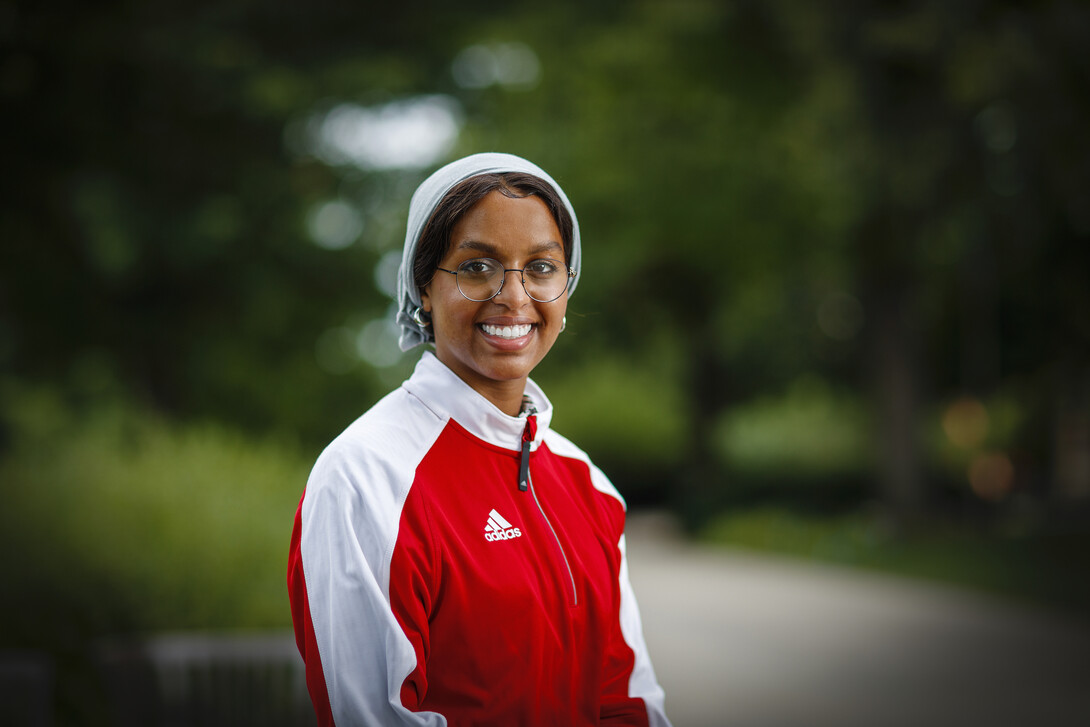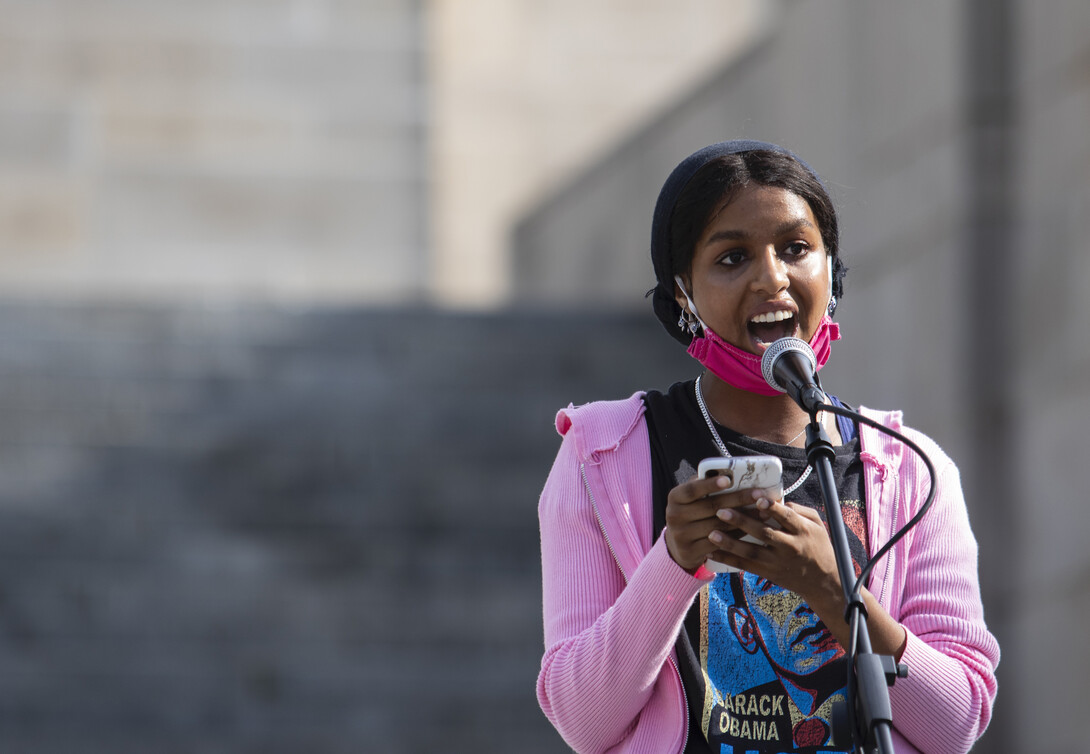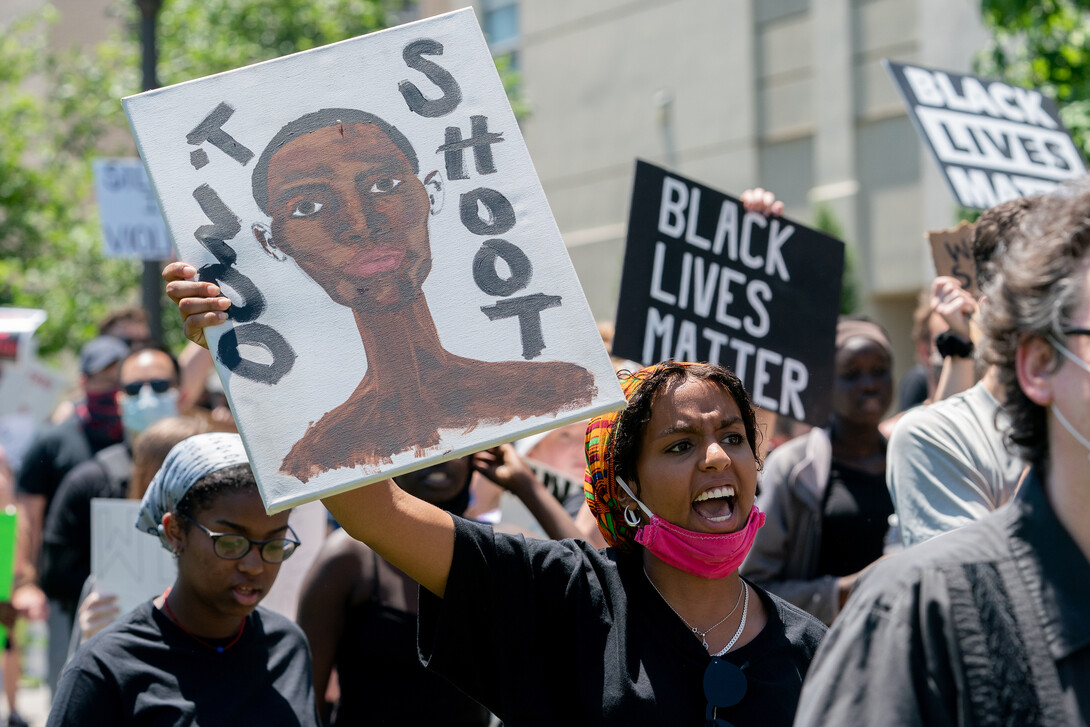
Since beginning her first year at the University of Nebraska–Lincoln, Batool Ibrahim has endeavored to change the landscape around her.
An aspiring immigration lawyer, the junior political science and global studies major wants to give a voice to her peers through her work in ASUN, as the president of the Black Student Union, and as a member in other organizations. Her advocacy work prior to this summer was primarily focused on campus, but as news broke about George Floyd’s death, Ibrahim helped organize protests and events for the entire Lincoln community.
She was integral in launching the BSU Care Bags program for the Lincoln community, and is leading a charge to bring more programming regarding racial injustice to students, including a sit-in this week to call for justice for Jacob Blake, who was shot by police officers in Kenosha, Wisconsin, on Aug. 22.
Ibrahim sat down with Nebraska Today as the new semester began to have a conversation on racial injustice, her advocacy on campus and beyond, and what she wants for future students at Nebraska.

What was your path to the University of Nebraska–Lincoln?
Batool Ibrahim: I grew up in Lincoln, but my path here was interesting. I was competitively involved in speech and debate in high school, and I really wanted to go to Georgetown on the East Coast, in Virginia. My brother went to UNL — he was a Buffett Scholar — and I was involved in Upward Bound, which is a program for low-income students to help them with college applications. I’m also a first-generation American, so my parents weren’t able to help me at all. UNL just seemed like the easiest fit, and I was a Nebraska Achievement Scholar, so I got some good scholarships. I just thought, ‘You know what? I guess I’ll go to UNL.’
You mentioned you’re a first-generation American. Where did your parents immigrate from?
My parents are from Sudan.
As a first-year student, what were some of the ways that you initially got involved on campus?
That’s why I’m doing the work I’m doing today, because it was so hard for me to get involved at first. And I was really looking for my community on campus. I would go to class and go home and I just had a very bad first semester. Then I started going into the (Jackie Gaughan) Multicultural Center where I met Miss Charlie (Charlie Foster, assistant vice chancellor for Inclusive Student Excellence). She’s amazing. She introduced me to the African People’s Union, and then from there, I realized there was a speech team on campus. I got involved that way, and it opened the doors to so many opportunities, and I met a lot of great people who will probably be lifelong friends. That helped me get my foot into doors of places that I wanted to be, so yeah, I really love the multicultural center.

What are the organizations you’re currently involved in on campus?
The African People’s Union and then the Black Student Union, of which I’m the president this year, so that’s been my main focus. I’m also a senator for the College of Arts and Sciences in ASUN — student government — and I’m also the co-chair for campus life and safety there. We also founded the Association of Future Black Lawyers on campus.
Why did you decide to major in political science and global studies? Was that something you wanted to do right away, or was that a niche that you found once you were immersed in college life?
When I was a kid, for some reason, my idea of a superhero was always a lawyer. They will always bring justice to people. My idea of a lawyer was just like this glorified Superman. I’ve always known that I wanted to be a lawyer. I wanted to give voices to people who have been silenced, or give a voice to people that don’t know how to necessarily navigate America, right? So, it just made the most sense. I came on campus, I talked to a few advisors and it seemed like political science was the main major that a lot of pre-law students go to. But I definitely wanted to add in my own experiences as a first-generation American. My parents are immigrants. So that’s why I added global studies as I wanted the global perspective of it. Hopefully, one day I will be an immigration lawyer.
Have you had any study abroad experiences?
I went to Morocco summer of 2018, the summer of my freshman year. I took Peace and Conflict Resolution, and I’m also a French minor, so I took a French course there, too.
2020 has been a tumultuous year. What has it been like for you personally? What does it mean to you personally?
I’ve gone through a lot of mental turmoil over the past few months. At first, it was because of COVID. And then, with what happened with Ahmaud Arbery — I think we found out in March, too. I remember reading this tweet that said, the men that killed him were not arrested, but then they were because we saw the video. And it really resonated with me, as a Black American. I have to actively always know what’s going on in my community across the United States, right? To see these injustices all the time. And it’s not something that I‘ve only gone through in 2020, right? And then Breonna Taylor happened, and that just really, really hit home. And then George Floyd.
I always make sure that I don’t watch the videos because it just hurts so much, but I think it came up on accident on Instagram, and it was playing and then I couldn’t stop it. I had to watch the whole thing. And I remember afterward, I was talking to my executive team, along with some of my friends in Lincoln and we were like, ‘We have to do something. We can’t just sit at home.’ We have to do something, so that’s when we organized the first march. We went out and made sure everyone was wearing masks, and that was the first time and then we went the next day. The next day and the next day and the next thing you know, we were marching all summer.
Around June, there was news about Oluwatoyin Salau. She was a Black Lives Matter activist in Florida who was found dead. And that really — like, I had to log off all social media. I had to just sit at home with people that I love because it really, really, really hurt. I’m getting a little emotional thinking about it because it really, really hurt. I could see myself in her. She was a college student who was out protesting for the humanity of her people. And she was missing for nine days, and then dead, and I was just thinking, ‘that could be me,’ but I really meant it — that could have been me.

You came of age as the Black Lives Matter movement began in 2013 and grew. How has that shaped you as an individual, and as an activist?
It made me reflect on my experiences. I started to really think about some of the experiences I’ve had here at UNL that have really been detrimental, and the fact that I couldn’t see that when it happened. It really kind of speaks to the layers of systematic and institutional racism. As a Black student, I’m not able to see when racist things happen to me, right? I was really just thinking about things that have happened to me and I wish that I was at a place then where I could have articulated how problematic it was — how detrimental it was — because I’m thinking about the Black students who are going to either enroll in that class with the same professor and who will perhaps have the same experiences.
I feel I have really grown. I know I’m only 20, but I feel like I’m about 37 after this summer. I’ve also really taken the time to educate myself. I think language is really important. I think it’s really important for Black people to know who has been at the frontlines before us so that we have the language to explain to our university officials, our professors, our mayors, our governors, why the actions that they are taking are a problem and why this cycle of racism will continue.
When the protests began, it was the summer term, which is not a typical time for students to be as engaged on campus. How did you all get together and form a sense of community and participate in the protests and make a call to action?
It really started with Facebook. Someone would post a protest and we reached out to whoever was hosting the protest, get to know them, and when we had our protest, they would come to ours.
This is a very historic moment for the Black communities in Lincoln, because a lot of our elders who have been in Lincoln for a long time have explained to us that this might be the first time this has happened here. All different Black organizations in Lincoln — doesn’t even matter who they’re advocating for, whether it’s educators, Black women’s rights, Black students — have gotten together in a room and demanded that this is what we want to happen, and this is how you can make it happen. I think it’s really important that right now, no one is asking anymore. We’re no longer asking. We’re demanding that these changes happen. And if it doesn’t happen, then we’re going to continue protesting. We’re going to continue advocating for ourselves and for our communities, because that’s how we’re going to survive.
Have you seen any changes made?
In many ways, we’re still in the conversation phase, but we should be starting to take the steps. Chancellor Green has been really supportive of our programming that we’ve done this year, and also the potential program that we will have throughout this year (through ASUN). We recently signed a letter with the ACLU calling for a special session with the legislators to really target police and racial justice reforms in Nebraska.
One fear that I’ve had as a student was doing all this hard work over the summer, really advocating for and supporting and uplifting my community, and then coming on campus and it dying down. We’re really pushing for this conversation to keep going. I’ve been trying to bring this conversation into roles that perhaps aren’t focused on racial issues on campus. As the ASUN co-chair of campus life and safety, we’re starting a series of events to really talk about racial experiences on campus, and how we can reach an equitable, inclusive campus where everyone feels like they belong. And I think that’s important. It can’t just be Husker Dialogues, which is one time. It needs to be ongoing.

Who is an individual who has inspired you?
I would say my best friend, Ibraheem Hamzat. He was the ASUN external vice president last year. He’s now a medical student in Chicago. The minute I stepped foot on campus, he came up to me, introducing himself. From that moment on, he made me feel like this is a place where I can belong. This is a place that I can change. If I see something wrong, I can change it. He’s really given me the power to be an agent of change. I think that he embodies that in every way. And I think that everything that I do on this campus is in hopes that I can mimic his leadership and the support that he gave me. He founded the Black Student Union, and as the president this year, I really made that my goal to go up to Black students and introduce myself and ask them how they’re doing. Because from my experience with him, I realized the importance of that. I think that he has laid out the foundation of my leadership, and I think it’s only a glow-up from here, right? Like they say, I’m only going grow from here, so I thank him in every way.
As someone who is a leader among students on campus, what is your advice for the students who will come after you?
I think it’s really important for you to take up space, and not even just take up space, realize how important it is for you to take up space. This campus is meant for us as students. We’re the ones investing money in this campus. This is our campus, and it can be what you want it to be. If it’s not there, create it, found it. If you’re in class and you feel like your story isn’t being told, tell your story. I think we are all scholars in that, through our own self-advocacy, through telling our stories and really taking up space and being revolutionary in the way that we take up space. It will lead you to great places and I think that’s what it means to be a Husker at its core — to really change what is wrong and show people why it’s wrong.







